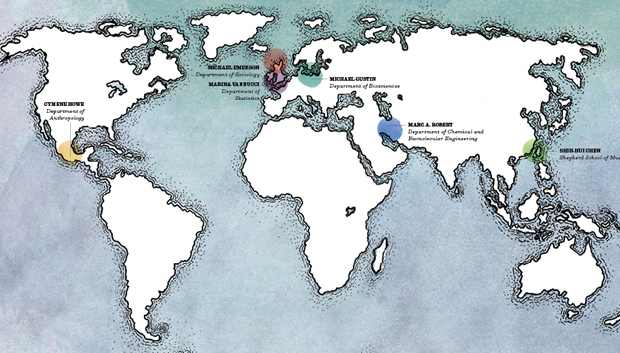When Rice faculty travel abroad on leave, no two sabbaticals are alike
BY LYNN GOSNELL
The word sabbatical, derived from sabbath, means rest. And while faculty members on sabbatical are not subject to the duties and schedules inherent in on-campus teaching, the sabbatical semester or year is rarely restful. In talking with six faculty members who have recently returned from a sabbatical, what’s clear is that such leaves are critical for the production of new scholarship.
Rice’s sabbatical policy is similar to other research universities, in that tenure-track or tenured professors are eligible for paid academic leaves devoted to research, scholarship or creative work after a period of service to the university. Such leaves are granted for one or two semesters, depending on the faculty member’s tenure status and other factors.
The ultimate goal is for the sabbatical to benefit the university’s students and faculty. The fruit of this extended time away from campus is generally scholarly publications or creative works — and, of course, new knowledge to share in the classroom.
“Faculty might be at the beginning, middle or end of a project,” said Paula Sanders, the vice provost for academic affairs and former dean of graduate and postdoctoral studies. Depending on the discipline or project, the faculty member might be working individually or collaboratively, close to home or far away “depending upon the resources they need,” she continued. Here are six examples of sabbatical leaves with an international component.
DATELINE: ABERDEEN, SCOTLAND, AND HOUSTON
Michael Gustin
Department of BioSciences
Award-winning Professor Michael Gustin applied for a yearlong sabbatical soon after he’d completed his tenure as Wiess College master (2006–2011), a job that kept him “pretty involved in college life.” To those familiar with Rice’s system of residential college governance, that’s an understatement. While living at Wiess, Gustin ran a research lab and taught large classes. “I was pretty stretched.”
“Because I was so involved, I thought I really needed to get away,” he said. And so he did, to the University of Aberdeen in Scotland. There, Gustin rented a small flat and rode his bike two miles uphill to campus in the morning and back down every evening.
“They have the largest research group in the world for what I work on,” said Gustin, who is an expert in medical mycology and fungal biology. Specifically, Gustin studies the biology of Candida albicans. Normally present in humans, Candida doesn’t cause a problem “unless your immune system is depressed,” he said. Gustin went to work with a longtime collaborator, Alistair Brown, who heads a “super-research group” of more than 50 researchers in the School of Medical Sciences. What Gustin particularly enjoyed was the chance to work at the bench, trading ideas and knowledge with students who were just beginning their careers. People came from all over the world to study there.
“In a late stage of your career, late stage of your life, to go away for six months to a completely different country and work there … it’s challenging, right?” said Gustin. While away, he used Skype to keep in frequent touch with his research lab back at Rice. That usually made for long days. His family stayed back in Houston, except for a brief visit and tour of the country in September. (Gustin returned to Houston for the second semester of his sabbatical.)
In addition to the pleasure of being able to conduct experiments, absorb new ideas and mentor doctoral students, the sabbatical, Gustin said, “was a kind of restart for me that was really helpful — reinvigorating my mind.”
Another aspect of getting away that Gustin enjoyed was the lack of interruption. “My phone never rang. I never expected it to ring.” This was in marked contrast to his time as a master, where distractions were the rule rather than the exception. “But there I could focus. It was amazing. It was lovely.”
This story is featured in the summer 2014 issue of Rice Magazine. To read the rest of the story and see other stories, visit http://tinyurl.com/mcu75s2.



Leave a Reply